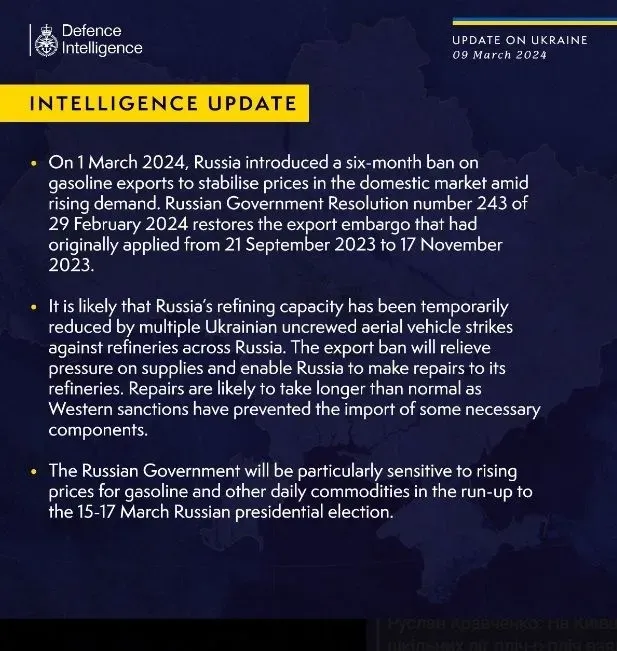British intelligence: Russian oil refining capacity temporarily reduced due to numerous Ukrainian drone strikes on refineries
Kyiv • UNN
Russian oil refining capacity was temporarily reduced due to numerous Ukrainian drone strikes on refineries across Russia, leading to a six-month ban on gasoline exports to stabilize domestic prices amid rising demand.

Since early March, Russia has imposed a six-month ban on gasoline exports to stabilize domestic prices in the face of rising demand, likely caused by the fact that Russian refining capacity has been temporarily reduced due to numerous strikes by Ukrainian unmanned aerial vehicles on refineries across Russia.
This is stated in a new report by the UK Ministry of Defense, according to UNN.
Details
According to the report, on March 1, Russia imposed a six-month ban on gasoline exports to stabilize prices in the domestic market amid rising demand. The relevant resolution was adopted by the Russian government on February 29.
This is the second embargo, which was previously in effect from September 21, 2023, to November 17, 2023.
"It is likely that Russian refining capacity has temporarily decreased due to numerous strikes by Ukrainian unmanned aerial vehicles on refineries across Russia. The export ban will reduce supply pressure and allow Russia to repair its refineries. The repairs are likely to take longer than usual, as Western sanctions are preventing the import of some necessary components," the intelligence service said.

It is also noted that the Cabinet of Ministers will be especially sensitive to rising prices for gasoline and other everyday goods in the run-up to the presidential election on March 15-17.
Recall
According to British intelligence, Russian troops are unlikely to be able to launch a full-scale assault on the town of Chasiv Yar in Donetsk region, despite some gradual tactical successes in the area.
Russian troops continue to hold a significant group near Avdiivka, Ukrainian National Guard spokesman Ruslan Muzychuk said on Thursday in a telethon.